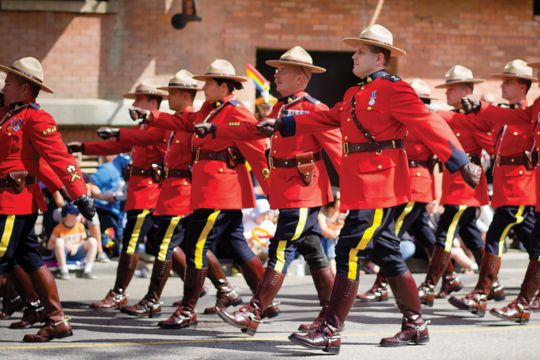
The RCMP is celebrating a historic milestone in 2023 — 150 years.
This year, the Royal Canadian Mounted Police — more commonly referred to as the RCMP, or “the Mounties” — is celebrating its 150th birthday. That’s a big event in a country that celebrated its own sesquicentennial only five years ago.
One could say that the country and the police force have grown up together, with the highs and dips that happen in all long-tracked narratives.
In general, Canadians hold the RCMP in high regard. In 2013, Statistics Canada reported that 87 per cent of those polled said the force played into their sense of national identity. The world at large is also aware of the RCMP. From the 1920s to the 1940s, Hollywood made a number of movies about the Mounties, including Susannah of the Mounties starring Shirley Temple and Cecil B. DeMille’s North West Mounted Police.
Adding to its fame, the RCMP has served in numerous peace missions around the world, with thousands of officers posted to more than 33 countries, including Sudan, Kosovo, the West Bank, Haiti and Afghanistan.
The RCMP provides at least some policing services, under contract, to all provinces and territories except Ontario and Quebec.
With a staff of 30,000, including 20,000 officers, there are constant retirements from the force, and many members join Federal Retirees. Steve Graham, of Bedford, N.S., is one of them.
Graham had a storied 38-year career in a storied force, serving in operations, security and staff roles. Near the end of his career, he was successively the Commanding Officer of Prince Edward Island (2001-2003), New Brunswick (2004-2008), and Nova Scotia (2008-2010).
As Federal Retirees Atlantic district director Roland Wells, who served 26 years in the RCMP himself, says, Graham is “intelligent and thoughtful — a man who has made important contributions to an institution that in some ways makes Canada Canada, so tightly is it woven into our national fabric.”
But Graham makes no great claims about himself. His satisfactions came from duty and service.
“At least in my early days, one of the things I liked was just the intensity in those small detachments,” he recalls.
“You needed stamina. You couldn’t go home before the phones stopped ringing, if they did. The life could be hard on families, but working with like-minded people, enforcing the law and serving Canadians the best [we] could in trying circumstances — for me, it was a great time.”
He recalls one time looking for a small girl who had wandered from her home in rural Nova Scotia. “These are always difficult situations,” he says. “But by good fortune, we managed to locate her. The delight in bringing things to a good conclusion has stayed with me since.” No doubt others would tell similarly rewarding stories.
Like all national symbols, the RCMP knits Canada into a tighter union, but Graham sees another respect in which this national police presence contributes to unity. “Our situation is unique,” he says. “Our recruits initially serve in small detachments across the country, and they frequently move — east to west, north to south, encountering and carrying with them the histories and cultures of all kinds of communities. It’s a kind of cross-pollination that can only help Canadians know each other better.”
No institution is perfect, and Graham acknowledges that such controversies as the 2020 mass shooting of 22 people in Nova Scotia and the ongoing class action suit alleging the RCMP’s failure to provide a workplace free from bullying, intimidation and harassment have sometimes left questions about the force’s comportment. “Things don’t always go perfectly,” he says. “The important thing has always been to look for learning, change and renewal and I’m sure that will happen.”

